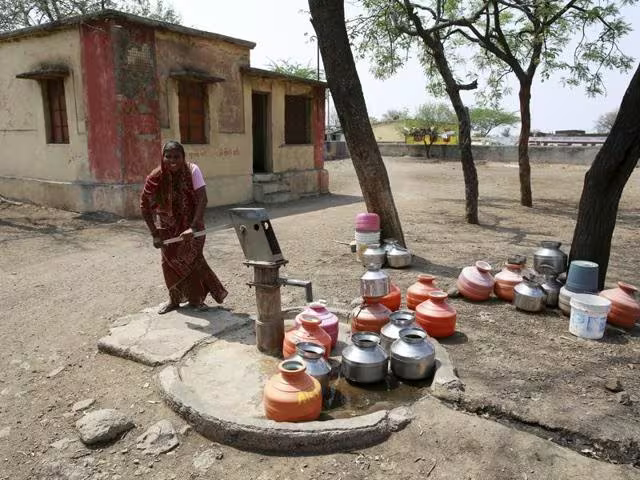Nearly 540 million people are in the grip of drought. Here’s what you can do: Find NGOs working in drought-affected areas. Reach out to them with donations in cash, kind and your time. At the very least try empathy, listen to stories, embrace compassion

Nearly 540 million people, 40% of our citizens in 11 states are in the grip of drought. Of these,160 million are children.(AP)
On Facebook a friend asks: “But what can we in cities do?”
I have just returned from a few days of heart-breaking reporting on the drought in Beed in Marathwada. In my ‘status update’ I had wondered how the lives of those of us who live in cities have become so disconnected with those that don’t.
Since facts are sacred, consider this: Nearly 540 million people, 40% of our citizens in 11 states are in the grip of drought. Of these,160 million are children. In Marathwada, which has been reeling under drought since 2011 (one year of decent rain in 2013 was followed by freak hailstorms early in 2014 which wiped out much of the standing crop), only 2% water remains in 11 major dams.
Read | Not a drop to drink in 500 villages in Maharashtra
Child labour has risen by 24% and the school drop out rate by 22% in Telangana, Maharashtra and Karnataka, says Nobel Laureate and founder of the Bachpan Bachao Andolan, Kailash Satyarthi. He wants Prime Minister Narendra Modi to declare the drought as a ‘national emergency’.
Read | Declare drought as national emergency: Nobel winner Satyarthi to PM
At Delhi’s Jantar Mantar, hundreds of people led by water conservationist Rajendra Singh converge for a jal satyagraha to demand a ‘water law’ that will ensure water security by identifying and protecting rivers, lakes, ponds and dams as common property.
But Parliament, caught up with Agusta Westland, has no time. Outside, issues like Modi’s degree dominate discourse. Readers and viewers cannot get enough of the latest juicy detail on the Kangana Ranaut-Hrithik Roshan spat. Yet, despite market demand for a different sort of news, channels and newspapers have, to their credit, sent out reporters to the dry heart of the drought. In Mint, Sayantan Bera’s report on Bundelkhand warns that the drought borders perilously close to a famine. Farmers with nothing to eat are abandoning their cattle to die.
And yet, we remain unmoved. You have to ask: Why do the lives of 540 million suffering Indians not concern us more?
Read | The water mafia is sucking India dry
Harsh Mander who heads the Centre of Equity Studies has been writing ceaselessly on the drought. In his 2015 book, Looking Away: Inequality, Prejudice and Indifference in New India, he writes about “the extraordinary indifference that people of privilege had for the intensive and pervasive levels of human suffering all around them.”
The government says India’s growth at 7.5% is among the fastest in the world. It’s ironic that never before in our history have we had so many with so much. We have the technology to communicate instantly and constantly, but we fail to connect.
Read | Water shortage to shrink global economy: WB
How do we experience the life of a child in Bundelkhand, just 439 km away from Delhi? How do we connect to a child whose father, a farmer, has killed himself in Latur? Does that child drop out of school to get trafficked or become a daily wage labourer? Why don’t we care?
Read | Drought impact: The least able are hit hardest
And, yet, because this is India, every truth has an equal and opposite truth. Distress births new heroes every day. In Latur, maths schoolteacher Sheikh Mateen Musa, reports India Today, has been distributing 10,000 litres of water a day from his borewell to his neighbours. A chemical engineer from Thane, Vivek Vadke, reports The Times of India, downsized his daughter’s wedding and sent the money he saved to two villages in Jalna and Nanded.
Read | In drought-hit Latur, woman dies while standing in queue for water
On May 3, Masaan director Neeraj Ghaywan and screenwriter Varun Grover tweeted that they were donating their National Award cash prize to alleviate drought distress. According to Buzzfeed India, this has led to others pitching in.
Read | MP farmer digs 90-foot-deep well to help village fight drought
It’s a trickle when it should have been a flood, but “people are open to giving,” says Indu Prakash Singh of Action Aid. “They are more willing to give than even the government.”
So, to answer my friend’s question, what can we in cities do? Here’s a start: Find NGOs working in drought-affected areas. Reach out to them with donations in cash, kind and your time. At the very least try empathy, listen to stories, embrace compassion.
But first try living on a bucket of water a day. You’ll still have a lot more than half the people of this country.
namita.bhandare@gmail.com
Twitter:@namitabhandare
The views expressed are personal